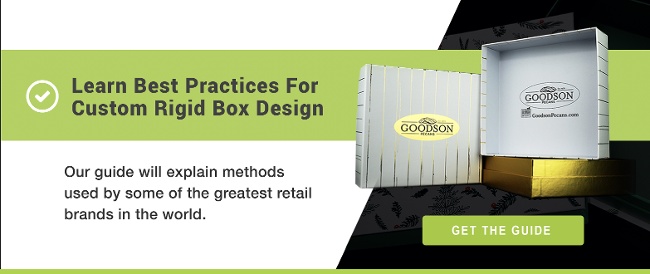Short of Hitting Sales Goals? Retail Packaging Might Be the Problem
Retail packaging is one of the only forms of modern advertising that buyers can’t opt out of with a mouse click.
If they do opt out, it means they didn’t make the purchase, and the company loses sales revenue. But a few simple steps in the right direction can turn your product’s packaging into a purchase magnet.
Imagine the moment your ideal customer walks up to your product on the shelf. This is your product’s meet-cute. It's time to shine! How does it look next to every other product on that shelf?
Your retail packaging is the first impression you give to your customers. If you don’t capture their attention, you may lose it forever. Shifting your retail packaging design to appeal directly to your customers’ needs and interests can make all the difference in smashing your sales goals out of the park.
Up Your Shelf Appeal
Your retail packaging should align with your company values and the product you sell. It should intrigue your customers enough to grab their attention, but also meet their expectations. It should stand out against the competition, while not being too far off from what your market expects regarding industry norms.
Being as iconic as Tiffany is the ultimate marketing goal. Unfortunately, brands that have reached that level of recognition are few and far between. You need to work with what you have built, and that might mean refreshing your packaging design every once in a while to keep it fresh and appealing.
Consider making seasonal changes. You'll want to maintain your signature design elements—maybe you have a color palette or graphics that you're known for. Otherwise, you may want to consider giving your customers a little something different to look at every few months.
Another thing to consider is market trends. If something is popular and it aligns with your brand, you should ride that wave. Just don’t push it beyond relevance in your branding. Follow trends, but stay true to the message that you want your customers to hear. Trends should not dictate your print and packaging design, but sometimes they can be harnessed to boost your sales.
Target Your Market with Your Retail Packaging Design
Buyers within specific markets have expectations when it comes to the branding of products. Buyers in a luxury market, for example, will be looking for rigid boxes in rich colors with classy enhancements.
Spot gloss on a matte finish creates a beautiful, eye-catching contrast. Investing in foils and spot UV pays itself back tenfold in the sales they help generate within your target market. When you are creating a new and exciting experience for your customers, you will have them reaching for your brand every time.
Choose the Right Color Palette
Market research is critical for knowing which colors should be representing your brand. Your color palette should be a reflection of your product and your company. The colors on a sports drink likely won’t fall on the same spectrum as colors on a luxury chocolate box. Know your audience, and know your product.
Color psychology should be a consideration when choosing your brand’s color palette. Remember that blues and light purples evoke a sense of calm, while reds and oranges will excite your audience. The colors you choose will impact your customer’s buying habits—either gravitating them toward your product or turning them away from it.
Get Creative with Your Messaging
The messaging on your retail packaging should be short and sweet. Get to the point and avoid excessive wording—you have about 3 seconds to win your customer over.
If you are selling a product that requires a lengthier explanation than what you can comfortably fit onto your packaging, consider adding a box link that can be scanned with smartphones. For their trouble, throw in a coupon as a surprise bonus.
Clarity is the key to packaging messaging. Your wording should be clear, concise, and eye-catching. Custom fonts are a great way to set you apart from your competition, but make sure that the important things—like warnings, ingredients, and your brand story—are clearly legible.
.jpg?width=800&name=safety-tread-2909967_1920%20(1).jpg)
Complete the Buyer’s Experience with Tactile Details
Touch is an extremely important detail that can’t be overlooked in your retail packaging design. It is one of our strongest senses, with the ability to sway our entire buying decision. Imagine picking up a product and the packaging was sticky, or sandpaper rough. Would you be inclined to buy it?
Now imagine a rigid box with a velvety-smooth texture. It exudes a sense of luxury, and you would feel like you were treating yourself by buying it. Your customers feel the same way when they pick your product up off a shelf.
The quality of your retail packaging should reflect upon the product within it. If you are selling a high-end product, your packaging needs to feel luxurious. The luxury packaging gives them faith that the product inside is worth their time and money.
Related Content: Strategies for Developing Appealing Product Packaging Designs
Increase Profits by Working with the Right Packaging Provider
Finding the right retail packaging provider is essential. They know what the packaging for your product should look like. They’ve done the research, and they know what your audience is looking for. Although your product might be unique, they’ve likely worked with similar companies and have direct experience with what works and what doesn’t.
They get it right the first time and save you money by properly sourcing materials and not making any costly mistakes with your design, so you don’t have to worry about stressful back-and-forth debates or missed deadlines. Fewer mistakes mean fewer chargebacks from big box stores and a lot of money saved in the long run.
Hitting your sales goals by improving your retail packaging design doesn’t have to be overwhelming. You already know a lot about your audience; you have created a product for them! If you can create packaging that reflects your product, you will have your potential buyers chomping at the bit to become customers. Protect your bottom line and increase your profits by working with a packaging and print company that understands your market and has your values and best interests in mind.





